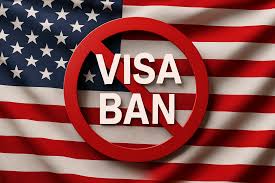
Daniel Otera
The United States has ramped up its efforts to hold corrupt leaders accountable, implementing strict visa restrictions on individuals involved in corruption and extending these measures to their close families. This global push for transparency is part of the U.S. government’s strategy to promote integrity in public life, exemplified through the #VisaWiseTravelSmart initiative led by the U.S. Mission in Nigeria.
The U.S. has underscored that these visa bans play a pivotal role in a broader effort to combat corruption, human trafficking, deceit, and other activities that hinder good governance. Such measures have previously targeted figures connected to smuggling operations or electoral manipulation, showing a firm commitment to hold individuals accountable even when local judicial systems face challenges.
The U.S. Embassy in Nigeria has reiterated that engaging in corrupt activities or submitting false information on visa applications can lead to lifelong disqualification from obtaining a visa, a stark warning to those considering such misconduct. “Even when high-profile individuals engage in corruption, they can be barred from receiving #USVisas,” the mission declared, reinforcing its stance on enforcing strict travel restrictions for wrongdoers.
This initiative, in line with U.S. policy since 2004 under Presidential Proclamation 7750, is rooted in the idea of protecting national security and promoting honesty in international interactions. By restricting entry for foreign officials who undermine democratic institutions or public trust, the U.S. aims to encourage transparency globally.
The U.S. has applied visa restrictions globally, including cases in Nigeria. Notably, in January 2023, certain Nigerian individuals were banned from entering the U.S. due to their involvement in undermining the country’s democratic processes during the 2023 elections. Similarly, in 2020, Nigerian politicians linked to violence and corruption during the 2019 elections faced sanctions, sparking public calls for greater transparency in the process.
Despite these sanctions, corruption remains a persistent challenge in Nigeria, deeply embedded in government, the judiciary, and security services. Surveys from the United Nations Office on Drugs and Crime (UNODC) paint a grim picture of Nigeria’s fight against corruption, with over 700 billion naira paid in bribes in 2023 alone. However, positive shifts have emerged, such as a reduction in the number of Nigerians facing repercussions for rejecting bribe demands, signaling slow progress in public attitudes toward corruption.
The UNODC surveys highlight government services, the judiciary, and the security forces as sectors most affected by corruption. Nigerians are often forced to pay bribes to access basic services, such as healthcare and education, while the police and military remain deeply tainted by graft. These systemic issues continue to undermine public trust and hinder the country’s progress.
The fight against corruption in Nigeria is far from over. While recent shifts in public perception are promising, the scale of corruption still hampers national development. Efforts from anti-corruption agencies like the EFCC and ICPC have had some success, but more significant reforms are required to root out corruption at all levels of government.
To make meaningful progress, stronger accountability measures must be implemented, alongside public education to empower citizens to report and resist corrupt practices. International collaboration, such as the repatriation of illicit funds, can also play a crucial role in enhancing anti-corruption efforts.
In a significant move, the U.S. repatriated over $311.7 million in stolen assets to Nigeria in May 2020. These funds, tied to the corrupt regime of former dictator General Sani Abacha, were designated for infrastructure projects like the Second Niger Bridge and the Lagos-Ibadan Expressway, aimed at improving the nation’s infrastructure and economic development.
This partnership highlights the complementary role of immigration tools, such as visa restrictions, in the broader fight against corruption. By leveraging diplomatic measures, the U.S. not only punishes corruption but also helps reinvest illicit wealth into crucial national projects.
This approach reinforces the message that those involved in corruption will face significant consequences that extend far beyond national borders.
